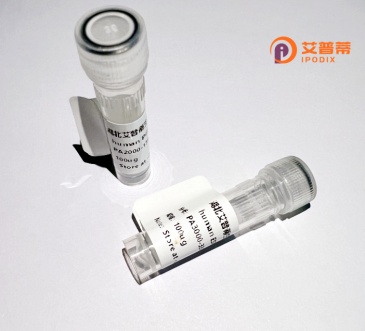
| 纯度 | >90%SDS-PAGE. |
| 种属 | Human |
| 靶点 | RAB7B |
| Uniprot No | Q96AH8 |
| 内毒素 | < 0.01EU/μg |
| 表达宿主 | E.coli |
| 表达区间 | 1-199 aa |
| 活性数据 | MNPRKKVDLK LIIVGAIGVG KTSLLHQYVH KTFYEEYQTT LGASILSKII ILGDTTLKLQ IWDTGGQERF RSMVSTFYKG SDGCILAFDV TDLESFEALD IWRGDVLAKI VPMEQSYPMV LLGNKIDLAD RKVPQEVAQG WCREKDIPYF EVSAKNDINV VQAFEMLASR ALSRYQSILE NHLTESIKLS PDQSRSRCC |
| 分子量 | 22.5 kDa |
| 蛋白标签 | His tag N-Terminus |
| 缓冲液 | PBS, pH7.4, containing 0.01% SKL, 1mM DTT, 5% Trehalose and Proclin300. |
| 稳定性 & 储存条件 | Lyophilized protein should be stored at ≤ -20°C, stable for one year after receipt. Reconstituted protein solution can be stored at 2-8°C for 2-7 days. Aliquots of reconstituted samples are stable at ≤ -20°C for 3 months. |
| 复溶 | Always centrifuge tubes before opening.Do not mix by vortex or pipetting. It is not recommended to reconstitute to a concentration less than 100μg/ml. Dissolve the lyophilized protein in distilled water. Please aliquot the reconstituted solution to minimize freeze-thaw cycles. |
1. **"RAB7B regulates TLR4/NF-κB signaling in intestinal epithelial cells"** by Sun et al.
摘要:研究揭示了RAB7B蛋白通过调控TLR4受体内吞及降解,抑制NF-κB炎症信号通路,影响肠道炎症反应,并验证重组RAB7B过表达对结肠炎模型的保护作用。
2. **"Rab7b modulates autophagosome-lysosome fusion in macrophages"** by Wang et al.
摘要:通过构建重组RAB7B突变体,证明其通过与HOPS复合物相互作用调控自噬体-溶酶体融合,影响巨噬细胞内病原体清除及炎症因子分泌。
3. **"Recombinant RAB7B expression and its role in mitochondrial dynamics"** by Zhang et al.
摘要:利用HEK293细胞表达重组人RAB7B,发现其通过结合Drp1蛋白调节线粒体分裂,揭示RAB7B缺陷导致线粒体功能障碍与神经退行性疾病的潜在关联。
4. **"Rab7b deficiency promotes pancreatic cancer metastasis via EGFR trafficking"** by Li et al.
摘要:研究通过重组RAB7B敲低模型,发现其通过调控EGFR溶酶体降解抑制胰腺癌转移,为靶向RAB7B的癌症治疗提供依据。
RAB7B, a member of the RAB GTPase family, plays a critical role in regulating intracellular membrane trafficking and vesicle transport. It is closely associated with late endosomal-lysosomal pathways, phagosome maturation, and autophagy. Structurally, RAB7B shares conserved GTP-binding domains with other RAB proteins, cycling between active GTP-bound and inactive GDP-bound states to mediate vesicle docking and fusion. Unlike its homolog RAB7A (which primarily controls late endosome-lysosome trafficking), RAB7B shows distinct functional preferences, including involvement in immune response modulation by influencing cytokine secretion and antigen presentation.
Recombinant human RAB7B protein, produced through genetic engineering in expression systems like *E. coli* or mammalian cells, retains native biological activity for *in vitro* studies. Its production enables researchers to investigate molecular mechanisms in lysosomal biogenesis, pathogen clearance, and inflammatory regulation. Dysregulation of RAB7B has been linked to immune disorders, neurodegenerative diseases, and cancer metastasis, making it a potential therapeutic target. Current research focuses on its interaction networks, post-translational modifications, and role in disease pathogenesis, offering insights for developing targeted therapies. However, functional overlaps with other RAB isoforms and context-dependent signaling effects require further exploration.
×